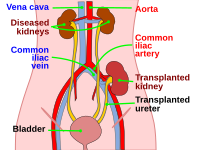
Photo from wikipedia
Introduction Kidney transplant recipients (KTR) are at an increased risk of infection with severe respiratory syndrome coronavirus 2 (SARS-CoV-2) with mortality from 13 to over 30%. However, data concerning the… Click to show full abstract
Introduction
Kidney transplant recipients (KTR) are at an increased risk of infection with severe respiratory syndrome coronavirus 2 (SARS-CoV-2) with mortality from 13 to over 30%. However, data concerning the influence of COVID-19 on long-term graft function in convalescents is lacking.
Material and Methods
A longitudinal controlled study was conducted in a group of 1058 KTR. Of 180 patients with COVID-19 in the past, 77 KTR (45 male) at a mean age 50.57±13.37 years, Charlson Comorbidity Index (CCI) of median (interquartile range - IQR) 3(3-5), Fragility Score (FS) of median (IQR) 3(3-3) and minimum 6 months after acute COVID-19 were included. The most common symptoms were: weakness (75.33%), fever (74.03%), cough (51.95%), and loss of appetite (48.05%). 33 of them were hospitalized, no one required invasive ventilation therapy, but 16 required oxygen support. The treatment of COVID19 included antibiotics (38.96%), thromboprophylaxis (25.97%), NSAIDs or paracetamol (25.97%).
The aim of the study
to evaluate the influence of COVID-19 on graft function at 6 months after recovery.
Results
The median (IQR) values of serum creatinine 3 months before the onset and 6 months after COVID19 were: 1.25(0.98-1.86) and 1.26(1.03-1.78) mg/dl (non-significant difference); in strata analysis, there were also no differences with regards to patients with higher and lower comorbidity (3
Journal Title: Transplantation Proceedings
Year Published: 2022
Link to full text (if available)
Share on Social Media: Sign Up to like & get
recommendations!